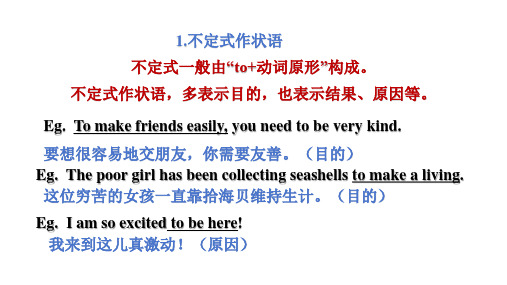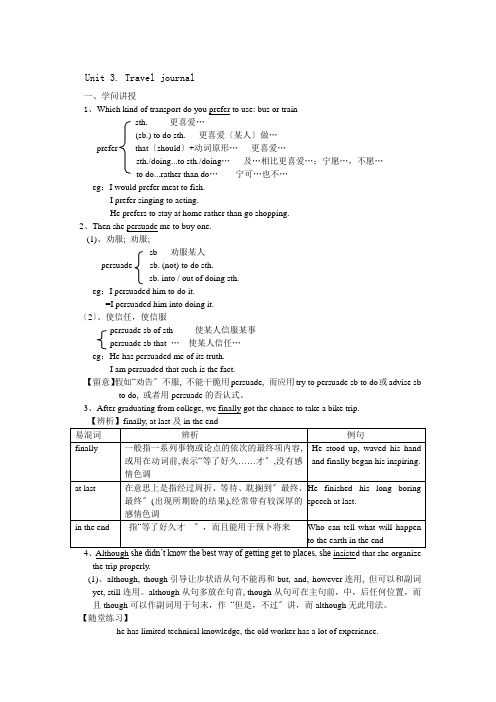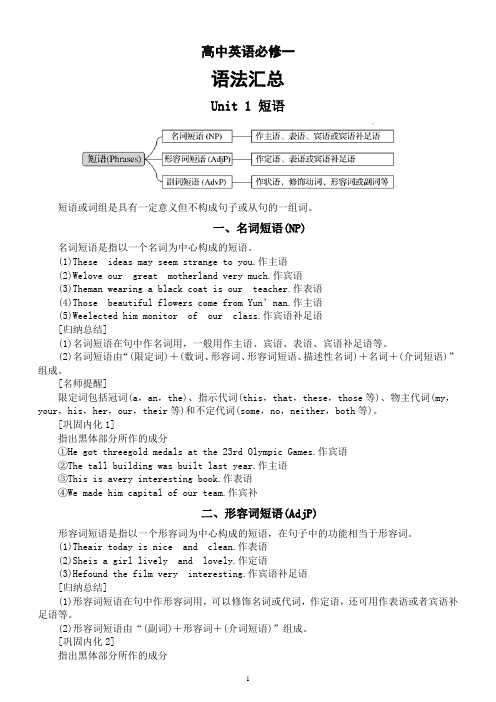人教版高中英语必修一Unit3语法知识
高一英语必修一unit3 语法

语法专练(二)定语从句之一一、含义及构成1、作用:相当于一个形容词性的定语,修饰主句中的名词或代词。
2、先行词:被定语从句所修饰的名词或代词。
3、关系代词:who/whom/whose/that/which/as4、关系副词:when/where/why5、定语从句的谓语动词必须和先行词在人称和数上保持一致。
二、示例1、This is a good film that(which) I saw a few days ago.2、This is the girl who has been looking for her wallet.3、I , who am your friend, am willing to help you.4、I’ll remember the days when we stayed together.三、关系代词的用法1、Do you know the man who’s talking to Mr. Wang?2、This is the girl (whom)you have been looking for?3、The boy whose parent are peasants works hardest.4、Who is the person that shook hands with you?5、I’ll remember our school which we studied in.6. We often talked of things and persons that we remembered in the middle school.6、the same as/such as/as…as1). This is the same pen as I found yesterday.2).Such people as are present at the meeting are from USA.四. 关系副词的用法1). This is the house where(=in which) I once lived two years ago.2). I’ll remember the day when (=on which)the People’s Republic of China was founded.3). I don’t know the reason why(=for which)Tom was late for class this morning.4). I don’t like the way that/不填/in which you speak to her.五. 非限制性定语从句1.His young sister, who is 18 years old, is a college student.His young sister who is 18 years old is a college student.2. All the magazines here, which have beautiful pictures in them, were written by him.3. 注意which/as的区别1). As we all know, the earth goes around the sun.2). Her sister has become a lawyer, which she wanted to be.六.关系代词that/which的区别1).当先行词是all/something/anything/nothing/everything/little/much等不定代词时,用that. Is there anything else that you want to say?2). 当先行词被最高级和序数词修饰时,用thatThis is the best film that I have seen.3). 当先行词被only/few/little/no修饰时,用thatThis is the only one of the good films that has been seen.4). 当介词提前时,用which而不用that.This is the house in which I once lived.七. 注意事项1. 注意确定先行词Is this factory___ you visited yesterday?A. thatB. whichC. whereD. the one2. 如先行词是those/anyone时,指人,则用whoThose who are working late into the night are teachers.3. 如先行词是point/scene/situation/position/stage时用where.We’re trying to reach a point__ both sides will sit down and talk.4. 如果先行词是occasion/period时,用when.5. 定语从句的谓语动词必须和先行词在人称和数上保持一致。
【人教版】高中英语必修一Unit3单元知识点

【⼈教版】⾼中英语必修⼀Unit3单元知识点必修⼀Unit3 Travel journal1.transport vt. 运输;运送n. 运输;运送;交通⼯具public transport 公共交通means of transport 交通⼯具transport sb./ sth. from…to…把某⼈/某物从……运送到……The goods were transported from the factory to the airport by air.His bike is his only means of transport.The goods were damaged during transport.2.prefer vt. 更喜欢,选择某事(⽽不选择其他事物),宁愿(preferred--- preferring)1)prefer sth/to do sth/ doing sth 喜欢做某事2) prefer sb to do sth 宁愿某⼈做3)prefer doing sth to doing sth 与……相⽐,更喜欢……4)prefer to do…rather than do… 宁愿做……不愿做……5)prefer that …(should) do… 更喜欢Preference n. 意为偏爱,喜好;优先权She has a preference for blue.Liu Hulan prefers to die rather than give in.I prefer walking to riding a bike/cycling.Their father prefers them to be home early.I prefer bananas to apples.3.disadvantage 为可数名词,意为不利条件,不便之处be a disadvantage to somebody 是某⼈的弱点be at a disadvantage 处于不利地位put somebody at a disadvantage/ be to one’s disadvantage置某⼈于不利境地/使某⼈处于劣势The fact that she cannot speak English put her at a disadvantage.To have only one leg is a disadvantage to him.I was at a disadvantage because I didn’t speak F rench.advantage 意为好处,优点,利益take advantage of利⽤/占……的便宜to one’s advantage 对某⼈有利advantages and disadvantages 利害得失The agreement is to our advantage.A better education gave us the advantage over those who didn’t receive education.You’d better advise him to take advantage of the opportunity.4.fare指乘坐公共汽车、轮船、出租车等的费⽤;(飞机等的)票价a bus/taxi fare 公共汽车/出租车费a single/return/round-trip fare 单程票/返程票/来回票价How much is the air fare to Beijing?Children under 4 go/travel half-fare/travel at full fare/reduced fare/half fare.fee指给律师、医⽣等专业⼈员的酬⾦或(参加考试的)报名费,(加⼊俱乐部的或⼊场的)会费或学费等,常⽤复数形式。
Unit+3+语法知识点课件-2023-2024学年高中英语人教版(2019)必修第一册+

5. Birds’ singing is sometimes a warning to other birds __t_o_s_t_a_y____(stay) away.
6.If there is a lot of work _t_o_d_o_________(do), I’m happy to just keep on until it is finished. 7.—The last one t_o__a_r_ri_v_e__(arrive) pays the meal.
—People in England rest two days a week.
—________________________. A.So Chinese are B. So are Chinese
C.So do Chinese D.So Chinese do
我对天文学很感兴趣,他叫我对全班做口头陈述。
(2)有些感官动词和使役动词接不定式作宾补时,通常不带to。 四看: see, watch, notice, observe 三使役: let, have, make 二听: hear, listen to 一感觉: feel
Eg. They made me wait while they checked everyone’s air tickets. 他们检查所有人的机票而让我等着。 注意:当make用于被动语态时,作宾补的不定式要带to。
Eg. Tom doesn’t have to be made to learn. 不必强迫汤姆学习。
6.不定式作定语
(1)不定式作定语一般与所修饰的名词构成主谓关系、动宾关系、 同位关系或偏正关系。
Eg. I am always the first person to get to the office. 我总是第一个到办公室的人。(主谓关系) Eg. There are lots of interesting things to see there. 那里有许多有趣的东西可看。(动宾关系)
高一英语必修一unit3知识点总结

高一英语必修一unit3知识点总结高一英语必修一Unit 3 知识点总结Unit 3 主要内容是关于人们的外貌和性格特征的描述,以及人们对个人形象的看法。
以下是对Unit 3的知识点总结。
一、词汇1. 形容外貌的词汇handsome(英俊的)、pretty(漂亮的)、attractive(有吸引力的)、ordinary(普通的)、slim(苗条的)、plump(丰满的)、short(矮的)、tall(高的)、curly(卷曲的)、straight(直的)、blond(金色的)、brunette(褐色的)2. 形容性格的词汇friendly(友好的)、outgoing(外向的)、introverted(内向的)、honest(诚实的)、hardworking(勤奋的)、clever(聪明的)、sensitive(敏感的)、patient(耐心的)、stubborn(固执的)、generous(慷慨的)3. 运动和爱好的词汇swimming(游泳)、running(跑步)、dancing(跳舞)、singing(唱歌)、painting(绘画)、reading(阅读)、playing football(踢足球)、playing basketball(打篮球)4. 形容服装和外观的词汇fashionable(时尚的)、casual(休闲的)、neat(整洁的)、messy(凌乱的)、fit(合适的)、loose(宽松的)、tight(紧身的)、colorful(色彩丰富的)二、语法1. 形容词的比较级和最高级形容词的比较级表示两者之间的比较,最高级表示三者或三者以上之间的比较。
比较级的构成规则:在形容词后面加上-er,或者在形容词前面加上more;最高级的构成规则:在形容词后面加上-est,或者在形容词前面加上most。
如:tall(高的)- taller(更高的)- tallest(最高的)2. 副词的比较级和最高级副词的比较级和最高级的构成与形容词相似,但前面需要加上more或most。
人教版高一英语必修一 Unit3 Sports and Fitness

反义疑问句总结:
1. 附加疑问句有两部分组成: 前一部分是_______句式,后 一部分是________句式,两者用逗号隔开。
2. 附加疑问句一般是前__________后否定或前__________ 后肯定。
3,附加疑问句又称反义疑问句。附加疑问部分的句式是: ______________ +主语。其中的主义必须是________.
I don’t think the girl understood the story , did she ?
附加疑问句的答语:2种
一种答语是:Yes 一种答语是: No
1. 事实是肯定的用“Yes”:
1. 事实是肯定的用“Yes”:
当陈述部分是肯定结构,附加疑问句部分用否定形式提问时,回到 Yes或No与汉
附加疑问句的例句(三):let’s、let us
5.let’s 开头的祈使句+shall we? 例如:let’s play basketball together,shall we? 我们 一起去打篮球好吗?(邀请对方一起做某事)
6. let us 开头的祈使句+will you? 例如: Let us go out for a work, will you ? 我们出去散步,行不行?(对方的许可,不包含对方)
Grammar:附加疑问句(反义疑问句)
附加疑问句的基本6种形式(一):
1. 肯定的陈述句+否定附加疑问部分? 例如: It was very cold yesterday, wasn’t it?
2. 否定的陈述句+肯定附加疑问部分? 例如: Mary doesn’t often go skiing , dose she?
高中英语 新人教版必修一Unit 3 Sports and Fitness: Texts +Grammar 课件

• 过去完成时:表示先于过去某动作发生前完成的动作,即“过去的过 去”。 形式:主语+谓语(had done)。
• By the time I rushed to the airport, the plane had left.
• Before he started to play basketball, he had finished her homework.
• LP won several championships before she became a coach.
• LP believed that her young players could win.
S
• Many people in China and the US Love coach Lang.
Unit 3 Sports and Fitness
Text部分
All sports for all people. —— Pierre de Coubertin
• 核心素养
教学目标与要求
• 语言能力:
主题:运动与健康
• 词汇:badminton,gymnastics,champion,compete...
• What examples does the writer use to describe Lang Ping?
• (Uses examples of Lang Ping’s determination to describe her. When her team had problems at World Cup, she still managed to lead them to become world champions.)
人教版高一英语必修一Unit3Traveljournal知识点详解和练习试卷1

Unit 3. Travel journal一、学问讲授1、Which kind of transport do you prefer to use: bus or trainsth. 更喜爱…(sb.) to do sth. 更喜爱〔某人〕做…prefer that 〔should 〕+动词原形… 更喜爱…sth./doing...to sth./doing … 及…相比更喜爱…;宁愿…,不愿…to do...rather than do … 宁可…也不…eg :I would prefer meat to fish.I prefer singing to acting.He prefers to stay at home rather than go shopping.2、Then she persuade me to buy one.(1)、劝服; 劝服;sb 劝服某人persuade sb. (not) to do sth.sb. into / out of doing sth.eg :I persuaded him to do it.=I persuaded him into doing it.〔2〕、使信任,使信服persuade sb of sth 使某人信服某事persuade sb that … 使某人信任…eg :He has persuaded me of its truth.I am persuaded that such is the fact.【留意】假如“劝告〞不服, 不能干脆用persuade, 而应用try to persuade sb to do 或advise sbto do, 或者用persuade 的否认式。
3、After graduating from college, we finally got the chance to take a bike trip.、Although she didn’t know the best way of getting get to places, she insisted that she organize the trip properly.(1)、although, though 引导让步状语从句不能再和but, and, however 连用, 但可以和副词yet, still 连用。
高中英语新人教版必修一全册语法汇总(分单元编排)

高中英语必修一语法汇总Unit 1 短语短语或词组是具有一定意义但不构成句子或从句的一组词。
一、名词短语(NP)名词短语是指以一个名词为中心构成的短语。
(1)These ideas may seem strange to you.作主语(2)Welove our great motherland very much.作宾语(3)Theman wearing a black coat is our teacher.作表语(4)Those beautiful flowers come from Yun’nan.作主语(5)Weelected him monitor of our class.作宾语补足语[归纳总结](1)名词短语在句中作名词用,一般用作主语、宾语、表语、宾语补足语等。
(2)名词短语由“(限定词)+(数词、形容词、形容词短语、描述性名词)+名词+(介词短语)”组成。
[名师提醒]限定词包括冠词(a,an,the)、指示代词(this,that,these,those等)、物主代词(my,your,his,her,our,their等)和不定代词(some,no,neither,both等)。
[巩固内化1]指出黑体部分所作的成分①He got threegold medals at the 23rd Olympic Games.作宾语②The tall building was built last year.作主语③This is avery interesting book.作表语④We made him capital of our team.作宾补二、形容词短语(AdjP)形容词短语是指以一个形容词为中心构成的短语,在句子中的功能相当于形容词。
(1)Theair today is nice and clean.作表语(2)Sheis a girl lively and lovely.作定语(3)Hefound the film very interesting.作宾语补足语[归纳总结](1)形容词短语在句中作形容词用,可以修饰名词或代词,作定语,还可用作表语或者宾语补足语等。
- 1、下载文档前请自行甄别文档内容的完整性,平台不提供额外的编辑、内容补充、找答案等附加服务。
- 2、"仅部分预览"的文档,不可在线预览部分如存在完整性等问题,可反馈申请退款(可完整预览的文档不适用该条件!)。
- 3、如文档侵犯您的权益,请联系客服反馈,我们会尽快为您处理(人工客服工作时间:9:00-18:30)。
Grammar
用现在进行时表示将来
当句子涉及确切的计划、明确的意图和为将来安排好的活动时, 现在进行时可用于表示将来。
1.现在进行时表将来使用的动词常为趋向性动词和表示位置转移的动词, 常用的有:
arrive, come, do, get, go, have, leave, meet, play, return, see, spend, start, stay, wear, work 等。
如:How are you going, by boat or by train?
I’m meeting you after class.
2. 现在进行时常表最近或较近的将来, 句子里常有一个表示未来的时间状语。
如: They’re leaving for Hong Kongthis afternoon.
What are you doing next Sunday?
I’m not going out for dinner this evening.
3.表将来的现在进行时有时含有“决心”的意思, 多用在否定结构中。
如:I’m not waiting any longer.
4.现在进行时也可在时间、条件或原因状语从句中表示将来。
如:When you are passing my house, please drop in.
If they are not doing it, what should I do?
Because the bride is coming, all the people are pleased.
5. 现在进行时表将来与一般现在时表将来的区别在于: 用现在进行时表示将来, 其计划性较强, 并往往暗示一种意图; 而一般现在时表示将来, 则其客观性较强, 即通常被视为客观事实, 多指按时刻表或规定要发生的情况。
如果主语是train, concert, programme 等表示事物的名词, 动词通常用一般现在时表将来而不用进行时。
如:What time does the train to Shanghai leave?
注意!
另外, 表示将来的动作或状态还可用以下几种形式:
(1) will / shall+动词原形
I shall be seventeen years old next month.
(2) be going to+动词原形: 表示即将发生的或最近打算进行的事。
We are going to have a meeting today.
(3)be to+动词原形: 表示按计划要发生的事或征求对方的意见。
如:Are we to go on with this work?
(4)be about to+动词原形, 表示即将发生的动作, 不与表示将来的时间状语连用。
I was about to go swimming when my guide shouted at me and told me not to do so.
我正要去游泳, 这时向导大声叫我不要去。
(5)be +V-ing形式: 表示按计划或安排要发生的事, 含义是“预定要……”这一结构常用趋向动词go, arrive, come, leave, start, stay, return和play, do, have, work, wear, spend, see, meet等。
--- Whenare you goingoff for your holiday?你什么时候动身去度假?
--- My plane is taking off at 9:20, so I must be at the airport by 8:30.
我乘坐的飞机将于9:20分起飞, 所以我必须在8:30之前赶到机场。
(6)一般现在时表示将来时
①按规定预计要发生的未来动作, 仅限于动词come, go, leave, move, start, return, arrive,
begin, stay等动词。
如:The plane takes off at 10:10. That is,
it’s leaving in ten minutes.
②在状语从句中用一般现在时代替将来时。
If you do that again, I’ll hit you.
③用在I bet 和I hope后面, 常用一般现在时表将来。
I bet you don’t get up before ten tomorrow.
我敢说你明天不到10点是不会起床的。
(7)单纯叙述未来的事实, 可以用将来进行时, 也可表示按计划安排将来要执行的动作。
如:
At this time tomorrow ____ over the
Atlantic. (2003北京)
A. we’re going to fly
B. we’ll be flying
C. we’ll fly
D. we’re to fly。
